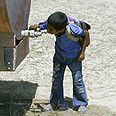
Report: Bedouin children suffer poorer health
Health Ministry report presents bleak reality of Negev children's health condition, with an infant mortality rate three times above national average and 56% anemia rate in infants. Report says poor infrastructure partly to blame
The infant mortality rate of Bedouins living in the Negev is the highest in Israel, a Health Ministry study published on Sunday showed. According to the report, Bedouin children suffer more from growth disorders, nutritional deficiencies, and underweight conditions that could cause serious damage.
The report, by the Beersheba District Health Office warned that a lack in infant welfare personnel in the Negev could lead to less pregnant women and infants receiving the care and guidance they need.
About 9% of Bedouin children under the age of five suffer from growth delays and 4.4% are underweight. Bedouin girls are at higher risk, and suffer seven times more than boys from growth problems and 10 times more from weight problems.
The trend only widens as the children get older, and in the first and second grades some 13% of Bedouin children suffer from growth delays, while 17% are underweight.
56% of babies anemic
Over half (56%) of Bedouin infants at the age of six-months-old suffer from anemia, and about a tenth of them have zinc deficiencies. At the average age of 18-months-old 27% of Bedouin children suffer from anemia, while 11.5% lack zinc, 5% lack Vitamin A and 3% have Vitamin E deficiencies.
Various studies conducted in Israel showed that only 10% of Jewish infants suffered from anemia.
The infant mortality rate among Bedouins stands at 11.5 deaths for every 1,000 births, and is almost three times higher than the national average of 4.1 deaths for every 1,000 births.
According to the report there has been a 5.5% decline in the infant mortality rate among Bedouins since 2004. The leading causes of infant mortality are related to birth defects and hereditary diseases.
Despite the harsh numbers, the report said a relatively high rate (90%) of Bedouin children are given all the routine vaccinations recommended by the Health Ministry and very few cases of infectious diseases are reported among this population. The average vaccination rate in Israel ranges from 92% - 97%.
Poor infrastructure leads to disease
Despite the high vaccination rates, there has been no drop in the rate infectious diseases that are not preventable by vaccinations, such as digestive tract diseases, that could be related to poor infrastructure and living conditions in the Bedouin sector.
The report says, "It's difficult for the residents to keep their houses cool or warm and to maintain personal and environmental hygiene in the absence of access to flowing water and waste disposal systems."
Bedouins living in unrecognized communities are in much poorer condition that those living in permanent communities, and according to the report, children born in unrecognized communities have a lower average weight at birth, are 2.4 times more underweight at the ages of six and seven-years-old and have a lower vaccination rate than Bedouin children living in permanent communities.
Some 7,000 Bedouin babies are born each year and are treated in some 27 clinics in the permanent communities and the surroundings.
Lack of medical personnel
"Supporting infant welfare centers and adapting them to the social and cultural characteristics of the Bedouin society is vital to improve the Bedouin children's health condition in the Negev," the report said.
"Right now the preventative services for the mother and child in the Negev are collapsing due to lack of medical personnel," the report continued, warning that a situation could be reached in which fewer women and infants are monitored.
The report's authors also recommended existing projects towards the prevention of birth defects continue, and programs encouraging proper nutrition and breastfeeding be operated. They also called for proper infrastructure such as a supply of water and electricity, waste and garbage disposal that will help promote the general health of the population.










